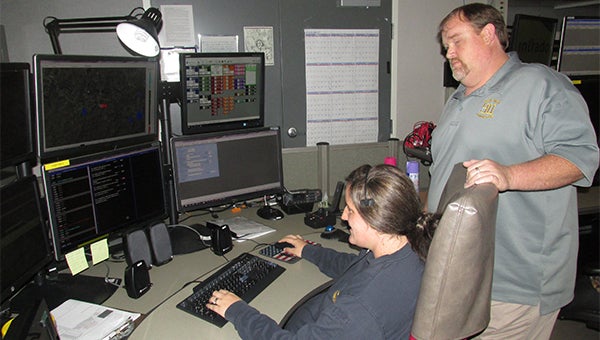Rufus finds his natural career with E911
Published 6:42 pm Sunday, September 24, 2017
Somehow, it just fit right.
Bobby Rufus didn’t go looking for a job when he went to visit a friend working as a dispatcher for Vicksburg-Warren 911.
“When I first moved here, I was doing mechanic work for RSC,” he said. “I came in one day on my day off just to sit and listen to the dispatchers, and I was very interested in it. They had me fill out an application, and it’s all history from there.
“I really wasn’t looking for a job at the time, and they said, ‘Here, try it any way.’ I really hadn’t planned on filling out an application for it. I never thought about applying. According to some, it was natural for me. I just fit in and hit the floor running.”
His first day on the job was Jan. 30, 2008. A year later, he moved to lead dispatcher, and then to supervisor a year after that. September 1, he was named 911’s deputy director, replacing Shane Garrard, who was named director.
Rufus said he was interested in becoming a dispatcher because of the excitement of the job “and being able to help people. I’d always been on the other side of the radio out in the field.”
A native of Florida, Rufus became interested in the volunteer fire service, becoming a cadet at age 15.
When he moved to Warren County, he joined the Fisher Ferry Volunteer Fire Department, where he stayed for 13 years before moving to the Culkin Volunteer Fire Department. During that time, he served in every position, including fire chief. Presently, he’s a driver/firefighter for Culkin.
When Rufus underwent dispatcher training, he said, the process was much different than it is now.
“We started out on the floor then; with our training program now, they (new dispatchers) don’t touch the floor until they’re trained and gone through it as far as learning the CAD (computer aided dispatch) and the protocols.
“We were out on the floor with a trained dispatcher. Back then, we were on the old CAD system, so it was dot and colon commands.”
With the communication center’s present system, he said, a dispatcher can click on the system to get units and activate them.
Under the old system, a dispatcher had to type in a command, using a colon, then the unit number to put a unit in service. “It wasn’t as easy as click and drag and select,” he said.
“It was rough at first; it seemed like a lot, because we had to remember all the dot and colon commands. There were so many of them. We’re still dealing with the same amount of units in terms of all the agencies, (but) to me it seems a little bit easier coming from there to this computer system we’re using now.”
Even in his free time, Rufus is never completely away from the center. Rufus said he listens to the scanner at home, adding if he hears something wrong, he’ll call up and correct the dispatcher or make a suggestion to them. “It never hurts to have the extra set of ears.”
And he still works on the dispatch floor helping out.
Part of the reason, he said, is because he has to spend eight hours a month working on the floor dispatching calls to maintain his certification.
As deputy director, Rufus is responsible for the dispatchers, responding to their questions and concerns if they’re having problems or a possible issue with an agency. He also handles questions and concerns from new dispatchers.
The way the communications center is organized, Rufus said, he is able to do what he needs to do to improve the center’s operations and quality, and still be on the communications floor and help dispatchers.
And he would like to one day become director.
“I’ve always wanted to move forward,” he said. “I used to always harass them when I first started when I was going up, and tell them I’m going to the front office, I’ve got a five-year plan. I delayed it because it got to the point I felt I could be more useful in the com. I could do more good back there. I thought that was the place for me at the time.”
He encourages his dispatchers to move toward promotions.
“I always tell my people, ‘if you’re not out to take my job, you’re not really doing me any good.’ I always want them moving forward. I tell my supervisors, ‘Train your people and work with your people to take your job.’
“I am still enjoying my job,” he said. Besides, he was a natural for the job.







